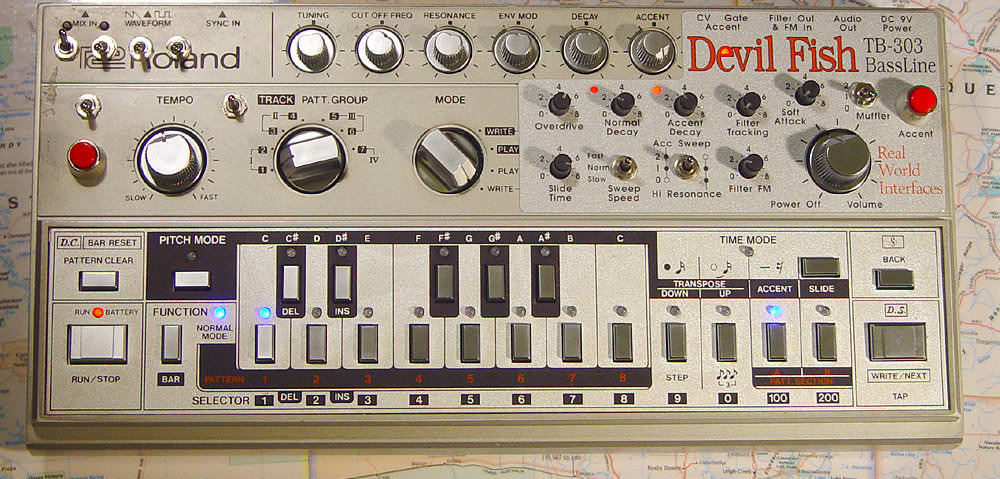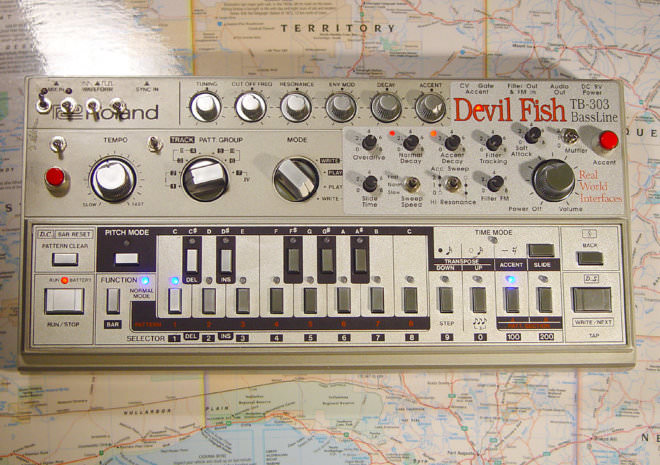TB-303 Devil Fish mod and Quiksilver CPU
Few synths can boast such a proud contribution to dance music as the Roland TB-303. Having played a pivotal role in acid house and become a staple in techno, the 303 remains one of the most sought-after instruments money can buy.
Despite its iconic status, it’s impossible to deny that the fact that the 303 is also one of the most basic synths ever made, at least in terms of its synth architecture. It’s all about that incredible filter with its cutoff and resonance knobs, of course, but other than that you’ve only got a single oscillator and a very basic envelope generator to play with when it comes to shaping the sound of the little silver box.
These days, chopping up and hacking a rapidly appreciating vintage classic like a 303 might seem like financial suicide at best, or borderline sacrilegious at worst, but a key part of the 303’s story is that it wasn’t always a valuable, highly prized instrument. Launched in 1982 and unceremoniously discontinued in 1984 after disappointing sales, the TB soon became a fixture of junk stores and pawn shops – at least until the explosion of acid house reignited interest in it.
Over the course of the last three decades, the 303’s simple circuits have proven irresistible for modders, spawning countless extensively hacked and upgraded units, plus a number of commercially available options including Social Entropy’s Quiksilver 303 CPU upgrade (which adds MIDI and radically overhauls the functionality of the built-in sequencer), Real World Interfaces’ Devil Fish and Analogue Solutions’ now-discontinued Borg mod.
Robin Whittle’s extensive documentation of his Devil Fish mods gives a good overview of what can be achieved when you start tinkering with the 303: filter overdrive, a range of CV inputs and outputs for patching to other gear, additional memory banks, extreme resonance for filter self-oscillation, extended envelope controls, and much more are all possible, making the unit far more versatile than it is in standard form. Of course, all that work doesn’t come cheap, starting at just over $1,200 shipped for the basic mods, but you get what you pay for in this case.


08.12 PM
What about the Mute Synth II?
07.16 AM
Great read. Thanks.
02.32 AM
The extensive envelope control on the x0xi0 is really the defining feature…but all in all, a wonderful, wonderful mod that transforms the x0xi0 into something else entirely…
04.24 PM
Well, going back, the E! and and SuperMAX for the Yamaha DX7 are pretty amazing, but maybe not so much for your audience. The SCI Pro One TurboCPU+MIDI might be though.
12.52 PM
http://vtol.cc/filter/instruments
02.29 PM
What about Europa for Jupiter-6 and Gligli for Prophet-600? They’re great inexpensive massive upgrades. Gligli is even free.
05.37 PM
There is no link for the Tubbutec mod in the article. Here is the link:
https://tubbutec.de/polysex